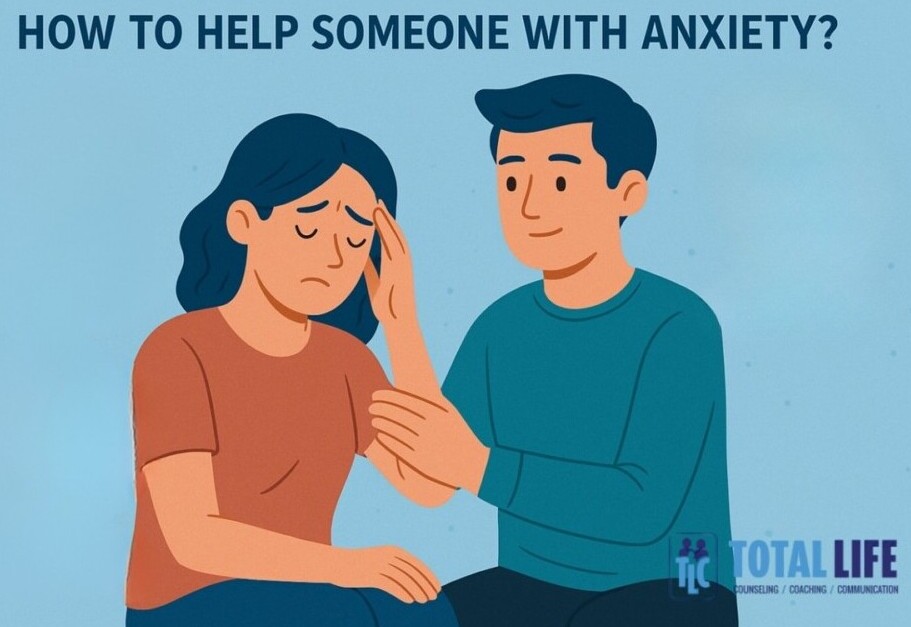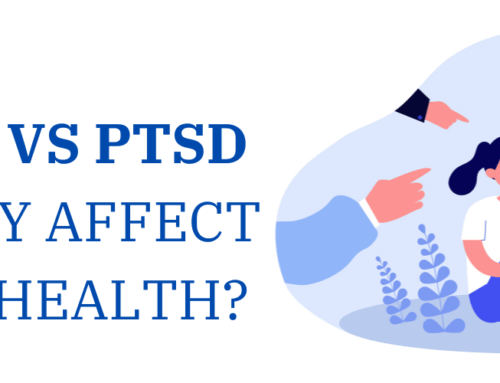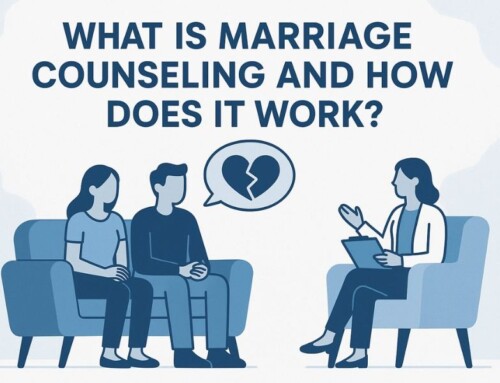How To Help Someone With Anxiety? 9 Expert-Backed Ways
TL;DR
|
|---|
Anxiety doesn’t always look the same. For some, it’s racing thoughts that keep them up at night. For others, it’s the knot in their stomach when they walk into a room or the fear that something bad is always about to happen.
In the U.S., about 1 in 5 adults (19.1%) live with an anxiety disorder every year, and nearly 1 in 3 will experience it at some point in their life. That means someone you care about, or maybe even you, might be quietly struggling.
But when fears are brushed off or misunderstood, it can make things worse. That’s why support matters.
At Total Life Counseling in Tampa, we offer more than just therapy, we offer a safe, judgment-free space to understand what you’re feeling and help you take steps toward relief. Whether it’s for you or someone you care about, we’re here when you’re ready.
What Does Anxiety Really Feel Like?
Anxiety isn’t just “being nervous.” It’s not something you can always shake off with deep breaths or a quick distraction.
It’s the weight that sits in your chest when nothing’s wrong but everything feels off.
It’s the tension in your body that never quite goes away.
It’s the racing thoughts, the what-ifs, the worry you can’t explain.
Anxiety disorders are the most common mental health condition in the U.S., affecting 40 million adults age 18 and older. And yet, they’re still often misunderstood.
This isn’t just a rough day or a stressful week. Anxiety can linger and disrupt your daily activities, your sleep, your focus, and your ability to enjoy everyday moments. For some, it shows up as constant worry. For others, it’s physical, like shortness of breath, nausea, or muscle pain.
How Can I Tell If Someone Is Struggling With Anxiety?
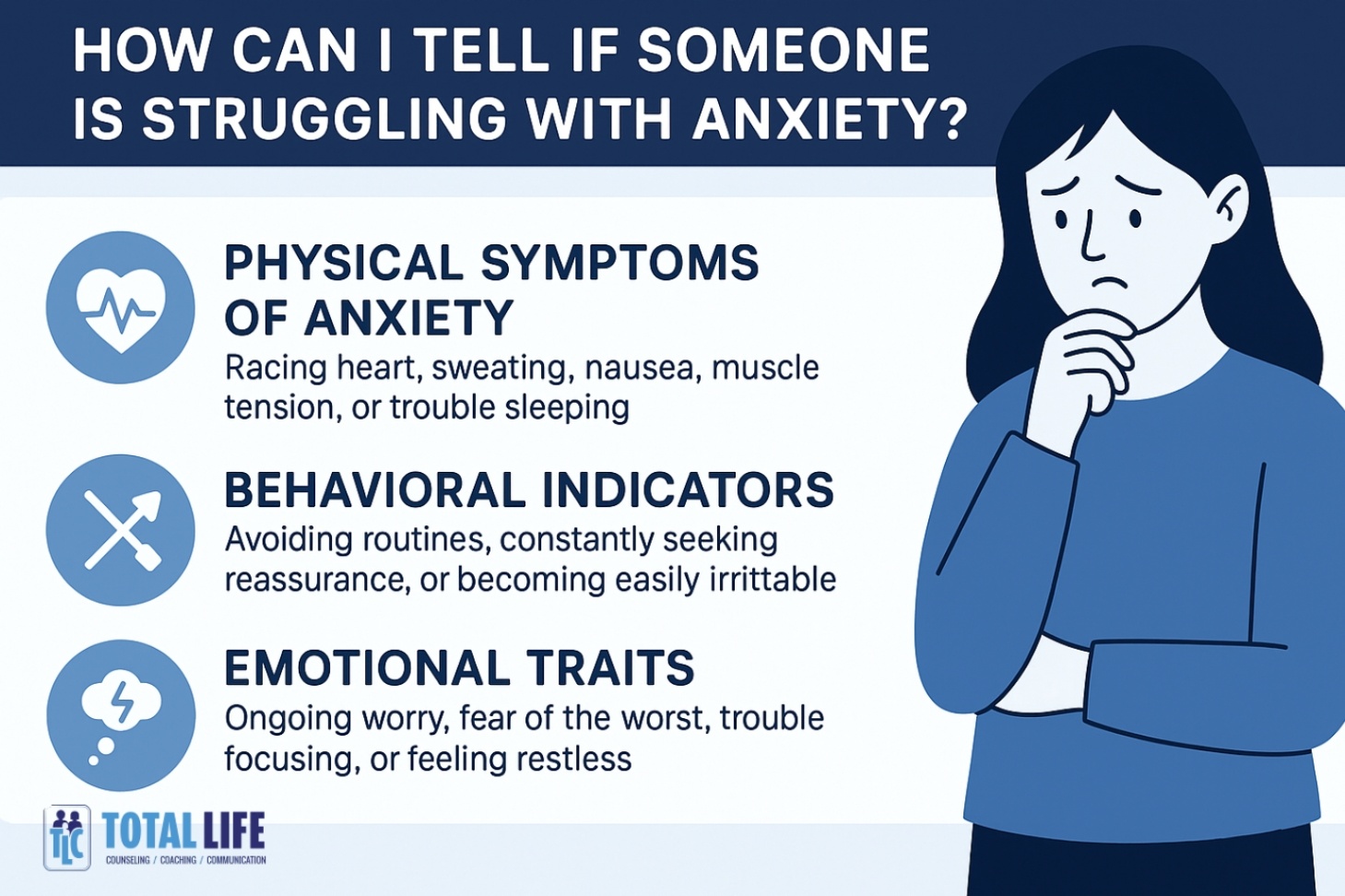
Anxiety can be hard to spot, in the United States, especially when it hides behind everyday stress or changes in behavior. But recognizing the signs of anxiety early can make a big difference.
Here are a few key symptoms to look out for:
- Physical Symptoms of Anxiety: Racing heart, increased heart rate, adrenaline-induced sweating, nausea, muscle tension, or trouble sleeping. Additionally, a physical exam may be necessary to rule out any underlying medical conditions.
- Behavioral Indicators: Avoiding routines, constantly seeking reassurance, or becoming easily irritable.
- Emotional Traits: Ongoing worry, fear of the worst, trouble focusing, or feeling restless.
Everyone experiences anxiety differently. Some feel it in their body. Others feel the trauma in their thoughts. Either way, noticing the signs is the first step toward getting support.
If someone you love is showing these symptoms or if you recognize them in yourself, talking to a mental health professional can help. Therapy, tools like CBT, and the right support system can make things feel a lot more manageable.
What Are The Different Types Of Anxiety Disorders?
Anxiety doesn’t always show up the same way. Each type brings its anxiety symptoms, triggers, and challenges, including insomnia. Understanding these differences can help you or a family member find the right kind of support, and it’s crucial to ensure you’re getting enough sleep to cope effectively.
Here’s a simple breakdown:
|
Type of Anxiety Disorder |
What It Feels Like |
|---|---|
|
Generalized Anxiety Disorder (GAD) |
Ongoing, uncontrollable worry about daily things like work, health, or relationships often results in persistent feelings of anxiety or dread, which can affect one’s quality of life. It’s important to remember that occasional anxiety, often addressed through talk therapy, is a normal part of life, and usually includes restlessness, fatigue, and muscle tension. |
|
Panic Disorder |
Sudden, intense panic attacks with symptoms like chest pain, shortness of breath, dizziness, or a fear that something terrible is about to happen. |
|
Social Anxiety Disorder (Social Phobia) |
Deep fear of being judged, embarrassed, or rejected in social situations. Can lead to avoidance of gatherings, meetings, or speaking up in public. |
|
Specific Phobias |
Extreme fear of a particular object or situation, like heights, flying, or needles. Often triggers immediate anxiety or panic. |
|
Separation Anxiety Disorder |
Intense fear of being away from loved ones or “safe” people or places. It is often seen in children, but adults can experience it too. |
|
Agoraphobia |
Fear of being in places where escape might be hard, like crowded malls or public transport. Often leads to avoidance and staying home for safety. |
No matter the type, anxiety disorders can impact daily life in real ways. But with the right treatment, like therapy, family counseling for separation anxiety disorder, medication, or supportive coping tools, healing is absolutely possible.
You’re not alone, and help is here when you’re ready.
How Can You Support Someone Struggling With Anxiety?
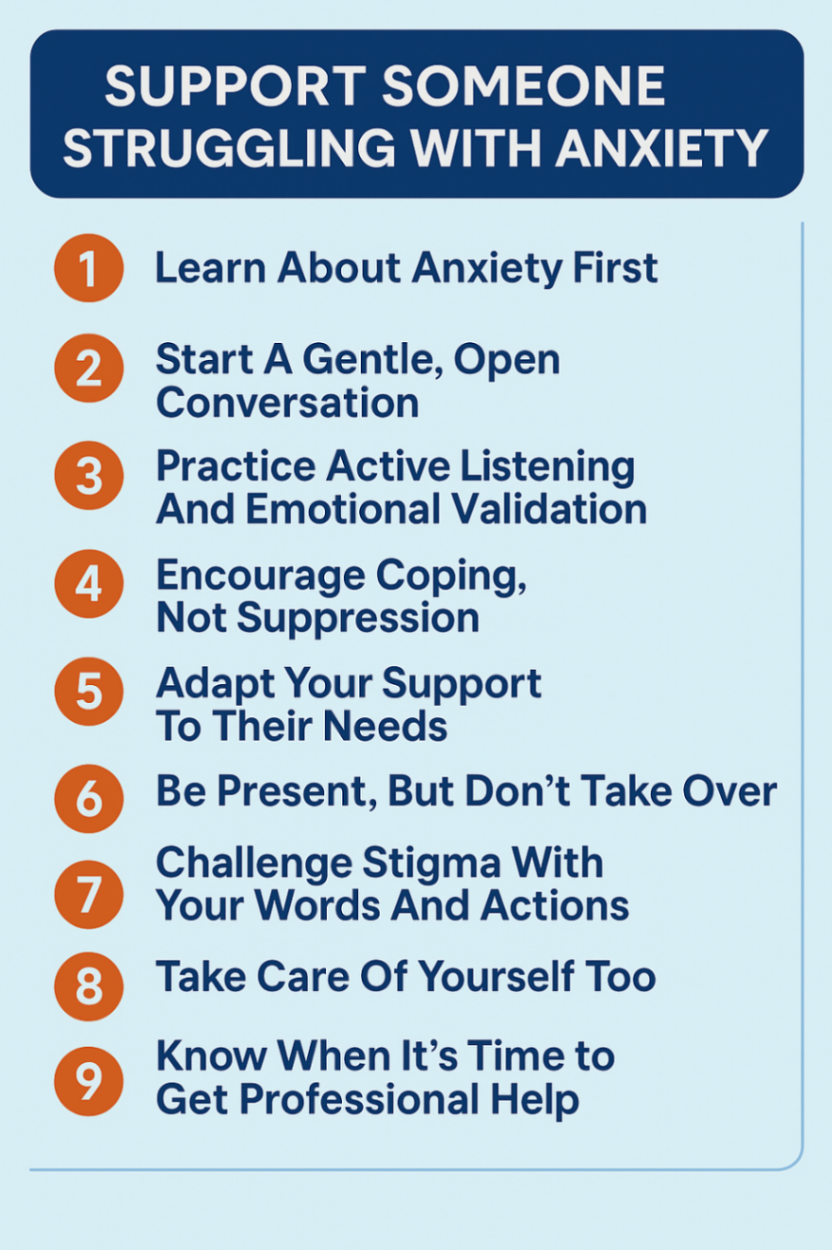
Anxiety isn’t always loud. Sometimes it’s hidden behind canceled plans, restless sleep, or a sudden silence in someone you love.
If you’ve noticed these changes and want to help, here’s how to do it in a way that’s gentle, respectful, and truly effective:
1. Learn About Anxiety First
Before you offer advice or ask questions, pause to educate yourself.
Remember that anxiety isn’t “just worry.” It can feel like being trapped in a loop of what-ifs, with physical symptoms like tightness in the chest or nausea.
Take time to read about conditions like GAD, panic disorder, ADHD, and phobias. The more you understand, the less likely you’ll say something dismissive like “just relax,” and the more helpful your presence will be.
Try this: Read an article from a reputable source and watch a short expert talk.
2. Start A Gentle, Open Conversation
You don’t need the perfect words. What matters most is that you show up with care. Instead of jumping in with “Are you okay?” try something like:
“I’ve noticed you’ve seemed a little off lately. Want to talk about it?”
Keep your tone soft. Leave space for silence. Let them know they don’t have to explain everything, but you’re here if they want to.
3. Practice Active Listening And Emotional Validation
When they open up, resist the urge to problem-solve immediately.
Instead, listen. Make eye contact. Put the phone down. Nod gently.
Use validating phrases like:
“That sounds really exhausting.”
“I can see why that would feel overwhelming.”
These small responses build trust. They also remind your loved one that their feelings are valid even if you don’t fully understand them.
4. Encourage Coping, Not Suppression
If they’re open to suggestions, gently offer ways to manage anxiety:
- Grounding techniques like the 3-3-3 rule
- Breathwork or short walks
- Journaling or guided meditations
- Attending therapy or support groups
What matters most is that the strategies feel doable. Don’t push routines that overwhelm. Start small, and remind them there’s no “right” way to feel better, just a path forward.
5. Adapt Your Support To Their Needs
Support isn’t one-size-fits-all. Some people with anxiety want company. Others need more independence. Some prefer texts over calls. Others want hugs or a quiet presence.
Ask them directly:
“What helps you when you feel anxious?”
“Do you want advice or just someone to listen?”
Their preferences might shift day by day, be flexible, and let them lead.
6. Be Present, But Don’t Take Over
You can’t and shouldn’t “fix” someone’s anxiety.
It’s tempting to offer solutions, make their calls, or cancel plans for them. But doing everything for them may reinforce the idea that they’re not capable.
Instead, offer support without removing their agency. For example:
“I can go with you to your appointment if it helps. But only if you want me to.”
That balance between care and respect is what builds real trust.
7. Challenge Stigma With Your Words And Actions
People with anxiety often carry shame, especially if they’ve been told they’re “too sensitive” or “overreacting.”
You can help shift that by normalizing mental health conversations.
Say things like:
“There’s no shame in struggling. Therapy helped me, too.”
“It’s okay to need help. That takes strength.”
Your voice can be part of the solution, just by being kind and honest.
8. Take Care Of Yourself Too
Supporting someone with anxiety can stir up your own emotions, especially if you feel helpless, frustrated, or drained.
Check in with yourself.
Are you setting healthy boundaries? Are you taking time to rest? Are you talking to someone about what you’re feeling?
Caring for someone else starts with caring for yourself.
9. Know When It’s Time To Get Professional Help
If their anxiety, especially significant anxiety, is disrupting their ability to function, like missing work, isolating, or having regular panic attacks, it may be time to connect them with a therapist.
Gently bring it up:
“Have you thought about talking to someone? I could help you find someone good.”
You can even help schedule an appointment or drive them to their first session.
Just remember: the decision has to be theirs.
The Bottom Line
You don’t need all the answers. You just need to offer steady care, an open heart, and a reminder that they’re not alone.
Because even the smallest acts of support, like listening without judgment, can spark healing
At Total Life Counseling in Tampa, our experienced therapists offer compassionate, personalized care to help you or your loved one feel more in control, less overwhelmed, and truly heard.
Call us today for a free consultation.
What Should You Avoid When Supporting Someone With Anxiety?
Even with the best intentions, some actions can make anxiety feel heavier, especially if they create pressure, dependency, or discomfort.
Here’s what not to do when trying to help:
1. Don’t Push Them To Talk Before They’re Ready
You might feel the urge to say, “Just tell me what’s wrong,” but pressure can trigger more anxiety, especially for those who struggle with social or panic-related fears. Instead, let them know you’re there when they’re ready; telling them to share immediately isn’t a good idea. Give them space to open up in their own time.
2. Don’t Try To “Fix” Their Anxiety
Anxiety isn’t something that disappears with quick advice like ‘just breathe’ or ‘think positive.’ Instead: Focus on being present. Listen, validate, and remind them that they’re not broken and don’t have to face a therapy session or treatment plan alone.
3. Don’t Enable Avoidance
It’s natural to want to protect someone you care about, but constantly rescuing them from triggers may reinforce their fears.
Instead: Gently support them in facing challenges, step by step. Encourage tools like CBT, mindfulness, or professional therapy that build resilience.
4. Don’t Dismiss Or Downplay Their Feelings
Phrases like “you’re overthinking it” or “everyone gets anxious” can feel invalidating, even if you mean well.
Instead: Try saying, “That sounds really difficult” or “I’m here with you.” You don’t have to understand their experience to support it fully.
Remember:
The goal isn’t to say the perfect thing or always get it right.
It’s to show up with empathy, stay steady, and offer support in ways that help, not harm.
Tired Of Carrying It Alone? TLC Is Here for You
At Total Life Counseling, we understand how overwhelming anxiety can feel. That’s why we offer a safe, supportive space to work through it, at your pace. Gemima McMahon, LMHC, specializes in counseling for women’s issues, couples, children, and teens. She is trained in Accelerated Resolution Therapy (ART) for treating PTSD, trauma, anxiety, depression, grief, panic attacks, phobias, and abuse. Whether you’re seeking help for yourself or someone you love, our trusted team of licensed therapists is here to support your journey with care that’s grounded in respect, empathy, and real results. Ready to feel more in control? Book a free consultation today.
Final Thoughts: Your Support Matters
Helping someone with anxiety doesn’t require perfect words, just emotional support, patience, empathy, and presence. One effective way to provide support is through mental health first aid. Here are some of the best ways to help them:
Listen without judgment.
Respect their pace.
Remind them that getting help is not a weakness, it’s a strength.
You don’t have to fix everything. Just showing up, consistently and kindly, can make all the difference.
Encourage healthy coping, and when they’re ready, help them connect with a professional.
Because with the right support, healing becomes possible and life feels a little lighter.
Frequently Asked Questions
How can I tell if someone needs professional help for anxiety?
If anxiety affects daily life, like work, relationships, or sleep, and doesn’t improve over time, it’s time to seek help. Withdrawal, panic attacks, or using substances to cope are also red flags.
What should I avoid saying or doing when supporting someone with anxiety?
Don’t minimize their feelings, offer unwanted advice, or say “just relax.” Avoid judgment. Instead, create a safe space where they feel heard and supported.
Can lifestyle changes really make a difference for anxiety?
Yes. Regular exercise, healthy meals, quality sleep, and mindfulness can lower stress and improve mood. These habits support long-term anxiety management.
How do I support someone who doesn’t want help?
Be patient and present. Respect their boundaries. Let them know you’re available when they’re ready. Small check-ins and gentle suggestions can build trust.
What is the 3-3-3 rule for anxiety?
Name three things you see, three things you hear, and three things you can touch. This grounding technique helps bring you back to the present moment.
What are 5 ways to calm down anxiety?
Breathe deeply, go for a walk, practice mindfulness, talk to someone you trust, and get quality sleep. These small steps can ease anxious thoughts and tension.
How can I take care of myself if I have an anxiety disorder?
Build a routine with mindfulness, movement, rest, and connection. Stay active, sleep well, and do things you enjoy. Consistency and self-kindness help manage symptoms.
How is generalized anxiety disorder treated?
GAD is often treated with therapy, especially CBT, and sometimes medication. Support groups and lifestyle changes also help reduce symptoms and improve daily life.
What is the prognosis for people with anxiety disorders?
With proper treatment and support, most people manage anxiety well. Early intervention, therapy, and healthy habits lead to strong long-term outcomes.
What other illnesses can co-occur with generalized anxiety disorder?
GAD often occurs with depression, panic disorder, or physical conditions like chronic pain. Treating all conditions together improves recovery and well-being.
What should I avoid saying to someone with anxiety?
Avoid saying “just calm down” or “you’re overreacting.” These phrases can feel dismissive. Instead, offer empathy and remind them you’re there for support.
Filed in: Anxiety, Gemima McMahon
Share This Story, Choose Your Platform!
Total Life Counseling Center consists of Licensed Counselors, masters level therapists, Español counselors, Licensed Mental Health Counselors, business coaches, and image enhancement coaches who provide counseling for emotional, mental, physical and spiritual care including marriage, individual, family, substance abuse and more. TLC’s family, trauma and marriage experts have been interviewed on National and Local TV/Radio over 200 times for their expert advice on Fox News, OWN, WETV, ABC’s Medical Minute and more. Our skilled counselors are relational, approachable and specialists providing therapy services in the Central Florida area including: Orlando, Winter Park, MetroWest, Windermere, Dr. Phillips, East Orlando, Lake Mary, and Clermont, Boca Raton Florida, and Dallas, TX.

